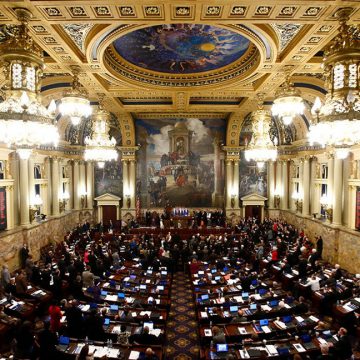
Late Wednesday night, the Pennsylvania House of Representatives passed a budget bill which includes expanded gambling that Gov. Tom Wolf (D) calls “irresponsible“. House Speaker Mike Turzai (R) pushed through a budget-funding bill as the latest move in a months-long standoff between the House, Senate, and governor.
The bill would take $507 million from mass transit, railway, port facilities, and infrastructure accounts. Siphoning from service funds proved controversial in debates leading up to the vote, which had a number of Republicans peal off from the rest of the GOP caucus. The gambling provisions are not specified, but gambling is included in the list of budget points.
The House Bill passed by a 103-91 vote around 10 pm. The budget plan now moves on to the Pennsylvania Senate, where the bill is by-no-means assured of passing. Senate Majority Leader Jake Corman (R) has disagreed all summer with Turzai’s budget stance.
Governor Wolf Criticizes House Bill
So has Gov. Wolf, though that is to be expected, given the partisan divide between the governor’s mansion and the House of Representatives. Before the vote was taken Wednesday, Wolf told the Philadelphia Inquirer, “There is some real hardship for people and institutions that people in this building really care about, and the people of Pennsylvania really care about.”
The House Bill pays for the $2.2 billion budget deficit by selling some of the proceeds for the state’s landmark 1988 tobacco settlement, while also expanding several types of gambling in the state. The bill also draws money from special funds that pay for state parks, mass transit, and environmental projects.
Controversy over Marcus Shale Oil
Mike Turzai’s bill does not tax the businesses involved in the Marcus shale reservoir. House Republicans argue that taxing the Marcus shale oil would hurt a Pennsylvania industry. A tax on the Marcus shale businesses has been a key part of proposals Tom Wolf has put forward throughout the summer. Some versions of the Senate’s budget proposals have included a shale oil tax, as well.
House Republican leaders argue their bill provides an alternative to new taxes on a gas companies. House Democrats are critical of Turzai’s plan, because they say it does not include the kind of recurring revenues which would offset the systemical, annual budget imbalance.
Budget Bill Could Fail in the Senate
Democrats predicted the Turzai bill will not pass in the Republican-controlled Senate. One suggested it was not a real solution, but an “opening bid” in order to get budget talks going again.
Major Leader Dave Reed (R) even said before the vote, “We’re going to move forward with this with the expectation we get to 102 votes and then we’ll enter into the next round of negotiations and hopefully finish that in a very timely fashion.”
Governor Wolf also made a prediction. He said that the House and Senate would have a compromise bill in place by Monday. Such a compromise would have two positive effects. First, it would keep Gov. Wolf from shutting down certain government services on September 15. Two, it would avoid a reevaluation of the state’s credit rating.
Pennsylvania’s Standard & Poor Rating
State Treasurer Joe Torsella (R) said Pennsylvania’s primary bank account is nearing zero, which could trigger a new stage of the debt crisis. Wolf says he expects Standard & Poor, the credit rating service, to downgrade Pennsylvania’s credit rating on Monday, if a responsible budget bill is not in place by then.
If the state’s credit rating were downgraded, it would make it more expensive for Pennsylvania to borrow money. For the time being, Tom Wolf said he plans to play the cards dealt him. Tough decisions are coming Friday, but Gov. Wolf said, “If they’re going to force this issue, I will manage the financial situation as best I can.”
Pennsylvania’s Expanded Gambling
The budget bill includes the promise of expanded gambling, though the exact forms of gambling are left unspecified. Since the state’s lawmakers have written several draft bills over the summer, certain inferences can be made from this week’s inclusion of expanded gambling.
Online gambling and daily fantasy sports have been in both House and Senate versions of the budget bill throughout the summer, it is reasonable to expect regulations for online casinos, online poker sites, and daily fantasy sports services. VGT legislation was in an earlier version of the House Bill, but is considered too controversial to put before the Senate.
Without a compromise soon, services will have to be cut. While some may see the government cuts as irresponsible or negative, many Republican voters see it as a long time coming. GOP voters in the state want taxes cut and services cut. They believe such hard decisions lift a tax burden off middle class taxpayers. Democrats believe the services are essential and helpful to the general good. They argue the tax cuts do not help working class taxpayers, but big business.
Pennsylvania’s budget crisis has played out in much the same way in several US states this year. Illinois, Kentucky, and Kansas all face similar budget crunches. In Illinois, lawmakers have sought more revenues from gambling. In Kentucky, that has been rejected offhand. Pennsylvania’s coming decision could be pivotal for the online gambling industry in the United States.















